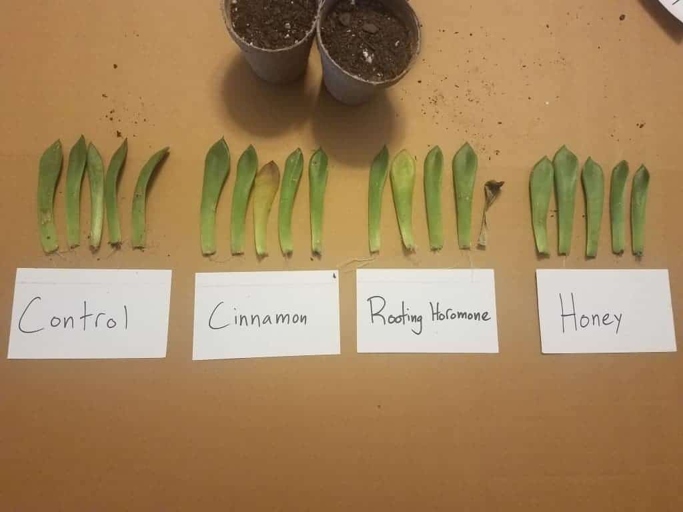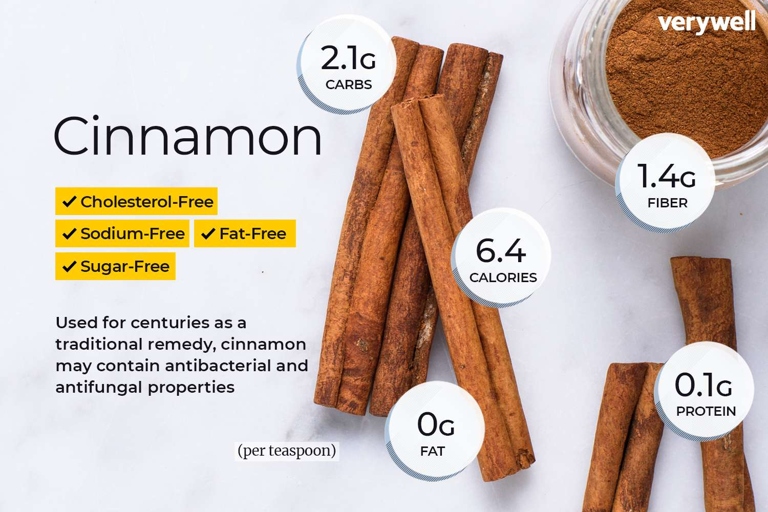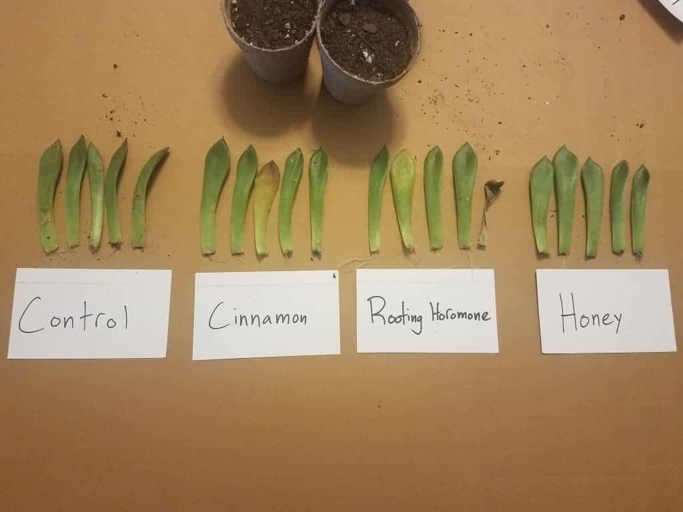If you’re looking for an alternative to rooting hormone, you can try using cinnamon. Cinnamon has been shown to be an effective rooting hormone and can be used in a variety of ways. Here’s a step-by-step guide on how to use cinnamon as a rooting hormone.
Grind Fresh Cinnamon Sticks into Powder
The cinnamon will help to promote root growth and help the plant to establish itself more quickly. You can then apply the powder to the base of the plant cuttings. Cinnamon is a popular spice that can also be used as a rooting hormone. To use cinnamon as a rooting hormone, grind fresh cinnamon sticks into powder.
Cut the Stems to a 45-Degree Angle and Trim Them
Then, use a sharp pair of scissors to trim the stem to the desired length. This will help the cinnamon to better penetrate the stem and encourage root growth. When using cinnamon as a rooting hormone, it is important to cut the stems to a 45-degree angle and trim them. To do this, simply use a sharp knife or pruning shears to make a clean cut at a 45-degree angle.
Consider Adding Honey to Hold the Cinnamon
The honey will help hold the cinnamon in place and provide extra nutrients for your cutting. If you’re looking for a natural rooting hormone, you may want to consider adding honey to your cinnamon mixture. Honey is a great source of carbohydrates, which can help promote root growth. Simply mix equal parts honey and cinnamon powder with a little water to form a paste, and apply it to your cutting.
Honey Holds Cinnamon to the Exposed Stem
Cinnamon has anti-fungal and anti-bacterial properties, which make it an ideal rooting hormone. Honey is an excellent rooting hormone for cinnamon. To use cinnamon and honey as a rooting hormone, simply mix the two together and apply to the exposed stem of the plant. The honey will hold the cinnamon to the stem and the cinnamon will help the plant to root. Honey also has these properties, making it an ideal partner for cinnamon.
Honey Provides Antibacterial Properties and Nutrients
Honey has antibacterial properties and is a natural source of nutrients, making it an ideal choice for use as a rooting hormone. Honey is a natural product that has been used for centuries as a home remedy for a variety of ailments. Cinnamon has been shown to be an effective rooting hormone, and when combined with honey, can provide an even more powerful rooting solution.
Submerge the Cinnamon-Coated Stem Halfway in Water
If you’re looking for a natural rooting hormone, cinnamon may be the answer. Cinnamon has been shown to promote root growth in a variety of plants, and it’s easy to use. Simply submerge the cinnamon-coated stem halfway in water and wait for the roots to develop.
It’s also inexpensive and easy to find. You can usually find cinnamon at your local grocery store. Cinnamon is a great choice for those who want to avoid using synthetic chemicals.
If you’re looking for a natural rooting hormone, cinnamon may be the answer. Cinnamon has been shown to promote root growth in a variety of plants, and it’s easy to use. Simply submerge the cinnamon-coated stem halfway in water and wait for the roots to develop.
It’s also inexpensive and easy to find. You can usually find cinnamon at your local grocery store. Cinnamon is a great choice for those who want to avoid using synthetic chemicals.

Cinnamon is also a great choice for those who want to avoid using synthetic chemicals. It’s easy to use, simply submerge the cinnamon-coated stem halfway in water and wait for the roots to develop. It’s inexpensive and easy to find, usually at your local grocery store. Cinnamon is a great natural rooting hormone for a variety of plants.
Dip the Roots in Cinnamon Powder and Plant Them in the Soil
Cinnamon is a natural source of a substance called cinnamaldehyde, which has been shown to promote root growth in plants. You can also add a teaspoon or two of cinnamon powder to the planting hole before adding your plant. Within a few weeks, you should see an improvement in root growth. If you’re looking for an easy and effective way to encourage your plants to grow, consider using cinnamon as a rooting hormone. To use cinnamon as a rooting hormone, simply dip the roots of your plant in a cinnamon powder and plant them in the soil.
Use Cinnamon as an Antifungal Agent
Cinnamon has been shown to be an effective antifungal agent against Candida albicans, the most common cause of fungal infections. In a study published in the journal Phytotherapy Research, cinnamon was found to be more effective than the antifungal drug fluconazole in inhibiting the growth of Candida albicans.

Steep for 10 minutes, then strain. Drink this tea three times daily. You can also apply cinnamon oil to the affected area three times daily. To use cinnamon as an antifungal agent, add one teaspoon of cinnamon powder to a cup of boiling water.
Cinnamon is a safe and natural way to treat fungal infections. However, if your infection does not improve after two weeks of treatment, see your doctor.
Key Takeaways
But did you know that it can also be used as a rooting hormone? Cinnamon is a popular spice with a long history of use in cooking and baking.
Here are some key takeaways on how to use cinnamon as a rooting hormone:

Cinnamon contains a compound called cinnamaldehyde, which has been shown to promote root growth in plants. 1.
To use cinnamon as a rooting hormone, simply dip the end of a cutting in cinnamon powder or oil before planting. 2.
Cinnamon can also be used as a preventative measure against fungal diseases. Simply add a few drops of cinnamon oil to your watering can before watering your plants. 3.
4. Be sure to purchase organic cinnamon to get the most benefit from this spice.
So there you have it! Cinnamon is not just for baking anymore. Now you can use it to help your plants grow strong and healthy roots.
Frequently Asked Questions
1. What is a rooting hormone?
A rooting hormone is a substance that helps stimulate root growth in plants. Cinnamon is a natural rooting hormone that can be used to promote root growth.
2. How does cinnamon work as a rooting hormone?
Cinnamon contains a substance called cinnamaldehyde, which is thought to stimulate root growth. When cinnamon is applied to the stem of a plant, it can help encourage the formation of new roots.
3. What are the benefits of using cinnamon as a rooting hormone?
Cinnamon is a natural and inexpensive way to promote root growth. It is also easy to find and use.
4. Are there any risks associated with using cinnamon as a rooting hormone?
Cinnamon is generally considered safe to use. However, it is important to avoid using too much, as this could damage the plant. It is also important to make sure that the cinnamon is completely dry before applying it to the plant, as wet cinnamon could promote fungal growth.
5. How do I use cinnamon as a rooting hormone?
To use cinnamon as a rooting hormone, start by mixing 1 teaspoon of cinnamon powder with 2 cups of water. Then, dip the base of the plant cutting into the mixture. Next, plant the cutting in potting soil and water it well. The cinnamon will help promote root growth and should help the plant to establish itself quickly.
Final thoughts
Cinnamon can be used as a rooting hormone to promote the growth of new roots on cuttings. To use cinnamon as a rooting hormone, first dip the cutting in water, then roll it in cinnamon, and finally plant it in a pot of soil. Water the cutting regularly and keep it in a warm, sunny spot. New roots should begin to grow within a few weeks.
